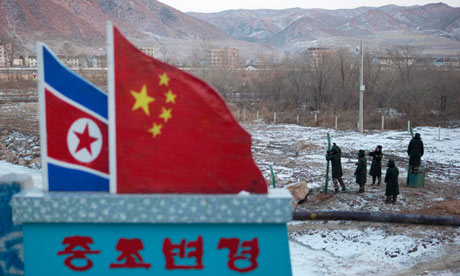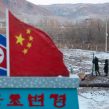
Tactical Pause in China’s Economic Engagement with North Korea
Publication: China Brief Volume: 14 Issue: 9
By:

There is no consensus in the Chinese expert community regarding the time frame of the next North Korean nuclear test. However, the policy debate that started with the rise of the “abandonment school” after the third nuclear test, which occurred in February last year, has now dried up (“Is Enough Finally Enough for China and North Korea,” China Brief, March 15, 2013). The debate, however, paved the way for a relative adjustment of China’s policy. Beijing no longer provides political support for greater trade and investment exchanges with North Korea, and Chinese customs and financial authorities have improved the implementation of UNSC sanctions. This rebalancing act—less support for economic ties, more emphasis on sanctions enforcement—came in combination with visible rapprochement with Seoul and a near freeze of political communication with Pyongyang with the exception of Chinese diplomatic activity to support resumption of the Six-Party Talks.
All signs, however, point to tactical adjustment rather than a fundamental break; China is not abandoning North Korea, but raising the stakes for Pyongang’s proliferation activities through indirect economic pressure. The view that economic engagement is the only long-term viable approach to revive the disarmament process and achieve the denuclearization of the Korean peninsula is still mainstream in China. At the same time, the purge of Jang Song Thaek—a key architect and advocate of deepening economic ties with China who was exerting control over many of the bilateral projects on the North Korean side—sent the wrong signal to Chinese entrepreneurs, even if it did not prompt a Chinese response beyond the Foreign Ministry’s comment that these were “the internal affairs of the DPRK” (Ministry of Foreign Affairs, December 9, 2013).
Diplomatic disaffection in Beijing and entrepreneurial wariness in China combine to put into doubt the feasibility of Kim Jong Un’s “byongjin line”—pursuing simultaneously economic development and nuclear deterrence—and especially its strategy of promoting growth in special economic zones and tourist areas. To regain Chinese support for economic development policies that Beijing supported between the second and the third tests, North Korea would need to offer guarantees on the nuclear front. Although these guarantees have yet to be detailed, nuclear tests clearly appear to be Beijing’s bottom line.
Available Data on Bilateral Economic Relations after the Third Test
Statistics published both by China and the ROK point to a continuous growth of trade after the third nuclear test. According to Chinese Customs statistics, bilateral trade grew 6.2 percent in the first ten months of 2013 (Xinhua, December 4, 2013). The Korea International Trade Association (ROK) reported a growth of 10.4 percent in 2013 with the trade volume reaching $6.45 billion (Yonhap, February 2). Some Chinese traders have reported last minute cancellation of transactions immediately following the purge of Jang Song Thaek (Global Times, January 7). These appear, however, to be isolated incidents. During interviews conducted in Dandong and Yanbian prefecture last month, all interlocutors agreed that the impact of 2013 events on bilateral trade had been minimal—including on barter trade, which is not included in official statistics—because commercial exchanges rely on networks, patterns, and interests that are not dependent on high-level politics, at least on the Chinese side.
The impact of sanctions on legitimate bilateral trade has been insignificant. Beijing’s commitment to enforce UN sanctions is limited to the targets specifically defined in the UNSC resolutions, namely, military products, specific companies and individuals, financial entities as well as a number of luxury products. Contrary to most other states, China has a restrictive definition of luxury products; it excludes, for example, cosmetics, an important export item at the border. China has resisted U.S. diplomatic pressure to adopt a more comprehensive approach to sanctioning North Korea for its nuclear weapons program by curbing bilateral trade. A good indicator is China’s oil exports, which remain stable at 500,000 tons per year as a result of a Memorandum of Understanding between the Chinese government and an unnamed state-owned enterprise [1].
Tourism and investment, however, have been affected by politics in the aftermath of the third nuclear test, although not in ways that suggest a clear-cut Chinese intention to punish North Korea beyond UNSC sanctions for its proliferation activities.
Local agencies in Yanbian autonomous Korean prefecture offering tours to Rason and other places in North Korea considerably reduced their tours in 2013 as a result of “tensions in the peninsula,” some even to the point of bankruptcy (China News Service, December 10, 2013). The ferry cruise from Rason to the scenic Mount Kumgang also was interrupted. There is no record of a political decision in Changchun or Beijing that would have intensified a logical drop on the demand side in a prefecture extremely sensitive to risks of nuclear pollution. In Liaoning province, the traditional point of departure for accessing Pyongyang by train, a minority of interlocutors suggested instructions existed to decrease the tour offerings. A normal situation resumed this year, with the first train liaison from Ji’an to Pyonyang opening in April and the Jilin provincial government planning future routes with the DPRK Bureau of National Tourism (Jilin Province Tourism Bureau, April 21; Xinhua, April 13).
A direct casualty of the interruption of China’s economic engagement policy was the construction of special economic zones at the borders with Jilin and Liaoning province. Opposite the city of Dandong, the special economic zone of Hwanggumpyong has not made any visible progress since the construction of the customs building began in the second half of 2012. The new Yalu River Bridge is expected to be completed in October 2014 and the Shenyang-Dandong High-Speed Rail in 2015, but transportation infrastructure construction progresses only on the Chinese side of the border. In Rason, there was no record of new Chinese investment in 2013. The shipping of Jilin coal to Shanghai has not proceeded on a regular basis through the North Korean port.
The Jang Song Thaek Effect
Since the end of 2009, Jang Song Thaek played a pivotal role in implementing Kim Jong Il’s policy of developing economic ties with China. During his August 2012 Beijing leading a 50-member delegation, he discussed the future of economic cooperation and signed an agreement creating a management committee for the two special economic zones of Hwanggumpyong/Wiwha and Rason (Ministry of Foreign Commerce, August 15, 2012). Jang was widely seen in China as a strong advocate of deepening trade and investment relations and the only North Korean politician with sufficient clout to carry out ambitious bilateral projects, such as the special economic zones.
Jang’s execution committee points to his revisionist promotion of market reforms and international opening and accuses him of having sold land in Rason to a “foreign country” in order to pay debts contracted in the coal trade—two allusions to his activities with China (KCNA, December 13, 2013). The Chinese consensus, however, is that the struggle that led to his execution was driven by competition over economic resources rather than ideology. At the same time, his purge raised the question of the sustainability of a policy supporting greater trade and investment relations with China.
A concrete short-term effect of the purge was the disappearance of a number of China’s business counterparts in North Korea (Global Times, January 17). The replacement of mid-level cadres in charge of managing exchanges with China reinforced the widespread sentiment among Chinese entrepreneurs that the “investment environment, which was not particularly good, has deteriorated” (BWChinese.com, December 17, 2013).
The purge of Jang also created additional uncertainties regarding the future of Rason and Hwanggumpyong/Wiwha. The North Korean government sent a signal of economic policy continuity in announcing the establishment of 14 special economic development zones, including one covering Hwanggumpyong, just before the public arrest of Jang (Yonhap, October 23, 2013). The move, however, also was interpreted in China as evidence of inconsistency in Pyongyang’s thinking regarding bilateral cooperation.
The Chinese press has speculated that a successor to Jang Song Thaek would be put in charge of spearheading the development of economic relations with China during the first half of this year. The names of Prime Minister Pak Pong Ju as well as the current Foreign Minister Ri Su Yong, the former ambassador to Switzerland and close associate of Jang Song Thaek, have circulated (Oriental Morning Post, February 27).
China’s Tactical Adjustment
Without political support in Beijing to improve the legal framework within which entrepreneurs operate, North Korea is unlikely to attract Chinese investments in its special economic zones. Before the third nuclear test, the Chinese government engaged in diplomatic efforts to institutionalize business relations and reduce unexpected costs and political risks. The issue topped the agenda of the August 2012 Jang Song Thaek delegation—the last high-level visit to address economic cooperation. There was no high-level visit until May 2013 and, ever since, China’s diplomacy towards North Korea focused exclusively on the nuclear issue and the resumption of the Six-Party Talks.
At the same time, Chinese policy adjusted on two important fronts: sanctions enforcement and relations with the South Korea. After the vote of UNSC Resolution 2094, China took visible steps to fulfill its international obligations. The most significant were the release by Ministry of Foreign Commerce of a list of items banned for export and the interruption of ties with North Korea’s Foreign Trade Bank shortly after the U.S. Treasury sanctioned it. There have also been reports of stricter custom inspections (NK News, 29 August 2013).
A second significant development has been the visible rapprochement between Beijing and Seoul in the context of their common opposition to some of the policies of the Abe administration. Of all foreign heads of states, President Park Geun-Hye received the highest diplomatic treatment during her state visit to Beijing in June 2013. The final joint statement praised her approach of security in the Korean peninsula. In a telephone call in April, President Park specifically asked President Xi to “advise” North Korea not to conduct a fourth nuclear test (China Daily, April 26). Tsinghua University professor Yan Xuetong, an advisor to the newly-established National Security Commission, recently underlined in a conference in Seoul the strategic interest of a China-South Korea partnership in the face of three common national interests: “the Japan threat, North Korea’s nuclear program, and peace in East Asia” (Ta Kung Pao [Hong Kong], May 2). He suggested that the two countries should establish a “formal alliance” (jiemeng). A minority view, it nonetheless underlines a shift from Pyongyang to Seoul that occurred in 2013 in China’s policies.
Conclusion
Between 2009 and 2012, China conducted a policy of economic engagement that was partly conceived as a tool to promote North Korean nuclear disarmament [2]. A return to economic engagement would require political commitment at the highest level in Beijing and summit diplomacy, which under the current circumstances necessitates, at minimum, no fourth nuclear test.
Although economic engagement is not conditioned to North Korean concessions on the nuclear front, the tacit message appears to be that economic cooperation will be off the agenda as long as Pyongyang continues provocative proliferation activities. While political passivity differs significantly from economic punishment, the current interruption of economic engagement is nonetheless a pause rather than a shift.
Finally, the shift from Pyongyang to Seoul in China’s approach of security in the Korean peninsula has been extremely fast, given Beijing’s reluctance to support publicly the South Korean version of the Cheonan incident in 2010. As tactical and reversible as it might be, it nonetheless suggests that some of the keys to stricter enforcement of UNSC sanctions or support for a more ambitious sanctions regime might be in Seoul. Of all parties to the Six-Party Talks, South Korea now appears in the best position to shape China’s response to North Korean proliferation activities.





